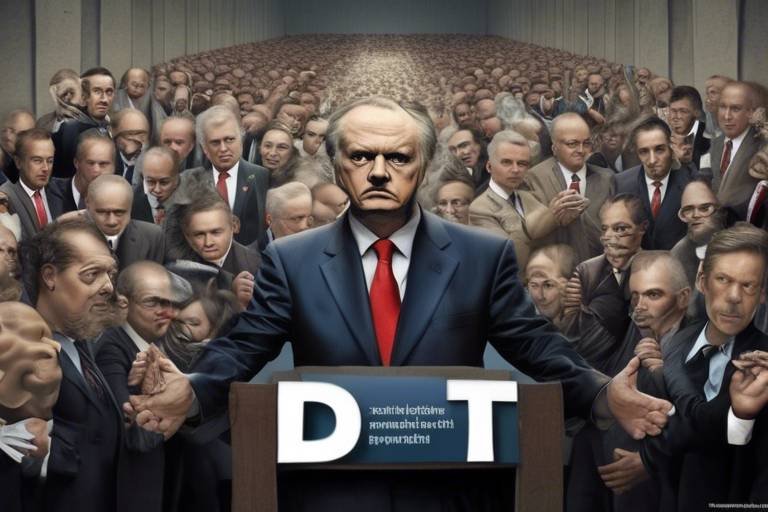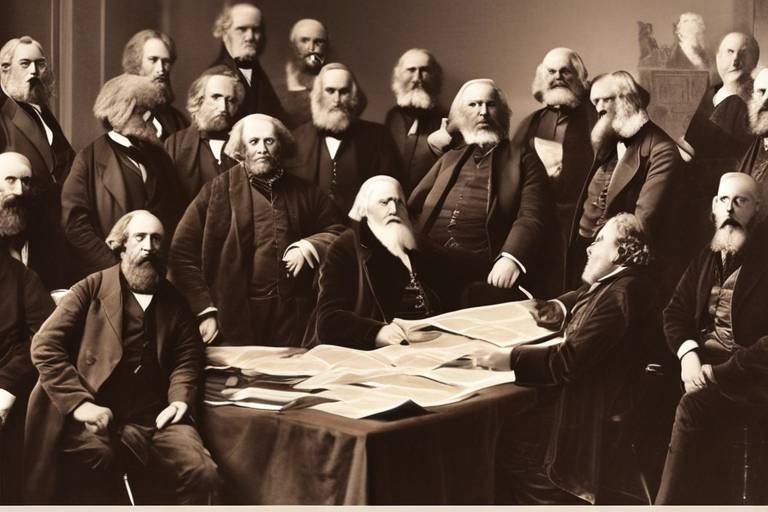The Philosophy of Globalization and its Political Consequences
Globalization is a multifaceted phenomenon that has reshaped the world in profound ways. But what exactly does it mean? At its core, globalization refers to the process of increasing interconnectedness among countries, economies, and cultures. It's like a vast web, where every strand represents a different relationship, whether economic, social, or cultural. As we delve deeper into this topic, we will explore its historical context, the various dimensions it encompasses, and the philosophical theories that provide unique insights into its implications.
To truly grasp the essence of globalization, we need to take a step back and look at its historical roots. This journey begins centuries ago, with trade routes that connected distant lands, allowing for the exchange of goods, ideas, and cultures. Fast forward to the 21st century, and we find ourselves in a world where the pace of globalization has accelerated dramatically, primarily driven by advancements in technology and communication. Today, we can connect with someone halfway across the globe in an instant, sharing ideas and cultures like never before.
Globalization can be broken down into several dimensions, each contributing to the overall tapestry of interconnectedness. These include:
- Economic Globalization: The integration of economies through trade, investment, and capital flow.
- Social Globalization: The spread of ideas, values, and cultural practices across borders.
- Technological Globalization: The rapid advancement of technology that facilitates communication and commerce.
As we explore these dimensions, it's essential to recognize how they intertwine and influence one another. For instance, economic globalization fosters social connections by creating job opportunities and cultural exchanges, while technological globalization enables faster communication, further enhancing economic ties.
Now, let's dive into the philosophical theories that help us understand globalization. Different perspectives shed light on its implications in unique ways, allowing us to appreciate the complexity of this phenomenon. Among these, three prominent theories stand out: liberalism, realism, and constructivism.
Economic liberalism posits that free markets and trade are the engines of prosperity. This perspective emphasizes the idea that when countries engage in trade, they not only benefit economically but also foster peaceful international relations. Imagine a world where nations are interconnected through commerce—it's like a giant marketplace where cooperation thrives. This subheading will delve into how economic liberalism shapes political policies and international relations in a globalized world.
Trade agreements are the lifeblood of globalization, facilitating the exchange of goods and services across borders. These agreements often lead to significant political consequences for the nations involved. For example, consider the North American Free Trade Agreement (NAFTA), which not only reshaped trade relations between the U.S., Canada, and Mexico but also influenced domestic policies and labor markets in each country. The political ramifications of such agreements can be profound, altering the balance of power and economic stability.
Global supply chains further illustrate the interconnected nature of economies in today's world. These networks of production and distribution span continents, showcasing how interdependence can affect political stability and economic power dynamics among nations. For instance, a disruption in the supply chain due to political unrest in one country can have ripple effects on economies worldwide, highlighting the fragility of our interconnected world.
On the other hand, constructivism emphasizes the role of ideas and identities in shaping international relations. This perspective posits that cultural narratives and social constructs influence how countries respond to globalization. For instance, how a nation perceives its identity and role in the global arena can significantly impact its political decisions. It's like a dance where each country moves to its own rhythm, influenced by its history, culture, and values.
As we unravel the threads of globalization, we can't ignore its political ramifications. The interconnectedness it fosters has led to significant shifts in sovereignty, governance, and power distribution. These changes have profound implications for both domestic and international politics, challenging traditional notions of state power and authority.
The tension between national sovereignty and global governance is a critical issue in today's world. As countries become more interconnected, traditional concepts of state power are challenged. Nations must navigate the delicate balance between maintaining their sovereignty and engaging in cooperative global governance. It's akin to walking a tightrope, where one misstep can lead to political instability.
In response to globalization, we've witnessed the rise of populism and nationalism in various parts of the world. These movements often emerge as a reaction to the perceived loss of control over national identity and sovereignty. As people grapple with the changes brought about by globalization, the allure of populist rhetoric can be powerful, promising a return to a simpler, more controlled way of life. However, this rise poses significant challenges for global cooperation and political stability.
- What is globalization? Globalization is the process of increasing interconnectedness among countries, economies, and cultures.
- What are the main dimensions of globalization? The main dimensions include economic, social, and technological globalization.
- How does economic liberalism view globalization? Economic liberalism posits that free markets and trade foster prosperity and peaceful international relations.
- What are the political consequences of globalization? Globalization leads to shifts in sovereignty, governance, and power distribution, impacting both domestic and international politics.

Understanding Globalization
Globalization is a term that has become increasingly prevalent in our daily conversations, yet its meaning can often be elusive. At its core, globalization refers to the process of increasing interconnectedness among countries, economies, and cultures. This phenomenon is not just a modern trend; it has historical roots that stretch back centuries, evolving through various stages of human interaction. From the early days of trade routes to today's digital highways, globalization has transformed the way we live, work, and communicate.
To truly grasp the essence of globalization, we must explore its various dimensions. Economically, globalization has led to a significant increase in trade and investment across borders. Countries are no longer isolated entities; they are part of a vast web of economic relationships. This interconnectedness can be illustrated by examining key aspects such as:
- Economic Integration: Nations are increasingly relying on each other for goods and services, creating a complex network of dependencies.
- Cultural Exchange: As people travel and communicate more freely, cultural ideas and practices spread rapidly, enriching societies but also sometimes leading to cultural homogenization.
- Technological Advancement: The rise of the internet and communication technologies has accelerated globalization, allowing information to flow instantaneously across the globe.
However, it's important to recognize that globalization is not without its challenges. While it has the potential to foster economic growth and cultural exchange, it also raises questions about inequality, environmental sustainability, and cultural identity. For instance, as multinational corporations expand their reach, local businesses may struggle to compete, leading to economic disparities. Similarly, the rapid spread of technology can create a digital divide, leaving some communities behind.
Historically, globalization can be traced through several distinct phases. The age of exploration in the 15th and 16th centuries marked the beginning of global trade, while the Industrial Revolution in the 18th and 19th centuries further intensified economic connections. The late 20th century saw the advent of globalization in its modern form, characterized by the rise of multinational corporations and advancements in technology.
In summary, understanding globalization requires us to look beyond mere economic statistics. It's about recognizing the profound ways in which our lives are intertwined with those of others around the world. As we navigate this complex landscape, we must consider both the opportunities and the challenges that globalization presents, ensuring that we strive for a world that is not only interconnected but also equitable and sustainable.

Theoretical Perspectives on Globalization
When we dive into the theoretical perspectives on globalization, we're stepping into a rich tapestry of ideas that help us understand the complex world we live in. Each theory offers a unique lens through which we can view the intricate web of global interactions. The three primary perspectives—liberalism, realism, and constructivism—each provide valuable insights into how globalization shapes not just economies, but also political landscapes and cultural identities.
Liberalism is perhaps the most optimistic of the theories. It posits that globalization, driven by free markets and trade, leads to greater prosperity and cooperation among nations. Supporters argue that as countries engage in trade, they become economically interdependent, which reduces the likelihood of conflict and promotes peace. This perspective has significantly influenced political policies, encouraging governments to embrace free trade agreements and open their borders to foreign investments. Consider the European Union as a prime example: its formation was largely motivated by the idea that economic collaboration would foster political stability across member states.
On the flip side, we have realism, which takes a more cynical view of globalization. Realists argue that the international system is anarchic, meaning that there is no overarching authority to enforce rules or norms. In this perspective, states are primarily concerned with their own survival and power. Globalization, from a realist standpoint, is seen as a tool that powerful nations use to further their interests, often at the expense of weaker ones. This theory highlights the competitive nature of international relations, where states vie for dominance, and economic interdependence can lead to vulnerability rather than security.
Then there's constructivism, which shifts the focus from material interests to the role of ideas, identities, and cultural narratives in shaping global interactions. Constructivists argue that globalization is not just about trade and economics; it's also about how nations perceive themselves and each other. This perspective emphasizes the importance of social constructs, such as nationalism and cultural identity, in influencing political behavior. For instance, the rise of populism in various countries can be understood through a constructivist lens, as leaders tap into national identities and cultural fears to garner support against the backdrop of globalization.
To better illustrate these perspectives, let's take a look at the table below, which summarizes the key features and implications of each theory:
| Perspective | Key Features | Political Implications |
|---|---|---|
| Liberalism | Economic interdependence, free markets, cooperation | Encourages trade agreements, promotes peace through collaboration |
| Realism | Anarchy of international system, state-centric, power dynamics | Focus on national security, competition among states |
| Constructivism | Role of ideas and identities, social constructs | Influences national identity politics, rise of populism |
In conclusion, understanding these theoretical perspectives on globalization is crucial for grasping its multifaceted nature. Each theory offers a different interpretation of how interconnectedness influences political dynamics, shaping everything from international relations to domestic policies. By recognizing the strengths and limitations of these viewpoints, we can better navigate the complexities of our globalized world.
- What is globalization? Globalization is the process of increasing interconnectedness among countries, economies, and cultures.
- What are the main theories of globalization? The main theories include liberalism, realism, and constructivism, each providing a different perspective on global interactions.
- How does globalization affect national sovereignty? Globalization can challenge traditional notions of state power, as countries increasingly rely on international cooperation and governance.
- What role does culture play in globalization? Cultural narratives and identities influence how nations respond to globalization, shaping political movements and public opinion.

Economic Liberalism
Economic liberalism is a cornerstone of modern political thought, advocating for the idea that free markets and trade are the engines of prosperity. This perspective suggests that when economies are allowed to operate with minimal government intervention, they can flourish, leading to increased wealth and improved living standards for all. But what does this mean in the context of globalization? As countries become more interconnected, the principles of economic liberalism shape not only international trade but also the very fabric of political policies across the globe.
At its core, economic liberalism promotes the idea that competition is beneficial. When businesses compete, they innovate, improve efficiency, and ultimately provide better products and services to consumers. This competition transcends borders in a globalized world, creating a marketplace where ideas and goods flow freely. However, this interconnectedness also raises questions about the role of governments in regulating these markets. Are governments merely facilitators of trade, or do they have a responsibility to protect their citizens from potential downsides of an unregulated market?
The implications of economic liberalism can be seen in various trade agreements and policies that nations adopt to enhance their participation in the global economy. For instance, agreements like NAFTA (North American Free Trade Agreement) and the TPP (Trans-Pacific Partnership) are designed to reduce tariffs and encourage trade among member countries. These agreements not only promote economic growth but also have significant political consequences. They can lead to shifts in domestic policies, as governments may prioritize international commitments over local needs.
| Trade Agreement | Year Established | Member Countries | Key Objectives |
|---|---|---|---|
| NAFTA | 1994 | USA, Canada, Mexico | Reduce trade barriers, increase investment |
| TPP | 2016 (signed) | 12 Pacific Rim countries | Enhance trade and economic integration |
Moreover, the emergence of global supply chains illustrates the profound impact of economic liberalism on international relations. These networks allow companies to source materials and labor from different parts of the world, optimizing production and minimizing costs. While this can lead to lower prices for consumers, it also raises concerns about labor practices and environmental standards in countries with less stringent regulations. The political consequences of these supply chains are significant, as they can shift economic power from traditional manufacturing hubs to emerging markets where production costs are lower.
In conclusion, economic liberalism is a driving force behind globalization, influencing not just economic policies but also the political landscape of nations. As countries embrace free trade and open markets, they must navigate the complexities that arise from this interconnectedness. The challenge lies in balancing the benefits of economic liberalism with the need for responsible governance that protects both economic interests and social welfare.

Trade Agreements and Policies
Trade agreements are the lifeblood of globalization, acting as the bridges that connect economies across the globe. These agreements are not just legal documents; they represent a complex web of negotiations that can alter the political landscape of nations. At their core, trade agreements aim to reduce barriers to trade, such as tariffs and quotas, thereby facilitating smoother exchanges of goods and services. But what does this really mean for countries involved? Well, it’s a double-edged sword. On one hand, countries can benefit from increased market access and economic growth, but on the other, they may face challenges such as job displacement and economic dependency.
Consider the North American Free Trade Agreement (NAFTA), which was implemented in 1994. It aimed to eliminate trade barriers between the United States, Canada, and Mexico. While it spurred economic growth in certain sectors, it also led to significant job losses in others, particularly in manufacturing. This situation raises a critical question: Are the economic benefits worth the social costs? As nations navigate the complexities of trade agreements, they must weigh these factors carefully.
Moreover, the political consequences of trade agreements extend beyond mere economics. They can reshape diplomatic relations and influence domestic policies. For instance, countries that enter into trade agreements often find themselves needing to align their regulations and standards, which can lead to a loss of sovereignty over certain domestic policies. This is particularly evident in sectors like agriculture and labor, where international standards may conflict with local practices and regulations.
To better understand the impact of trade agreements, let’s examine some key elements:
| Element | Description |
|---|---|
| Tariff Reductions | Lowering taxes on imported goods to promote trade. |
| Regulatory Alignment | Standardizing regulations across countries to facilitate easier trade. |
| Dispute Resolution | Establishing mechanisms to resolve trade-related disputes between countries. |
As we navigate this intricate web of trade agreements, it’s essential to recognize that they are not static. They evolve in response to shifting political climates and economic conditions. The recent renegotiation of NAFTA into the United States-Mexico-Canada Agreement (USMCA) is a prime example of how countries adapt their trade policies to reflect contemporary priorities, such as labor rights and environmental standards.
In conclusion, trade agreements and policies are a fundamental aspect of globalization that can yield significant economic benefits while also presenting substantial political challenges. As nations continue to engage in these agreements, they must remain vigilant about the implications for their sovereignty and domestic welfare. The balance between embracing globalization and protecting national interests is a delicate one, and it will undoubtedly shape the future of international relations.
- What are trade agreements? Trade agreements are treaties between two or more countries that outline the terms of trade and economic cooperation.
- How do trade agreements affect local economies? They can stimulate economic growth by providing access to larger markets, but they may also lead to job losses in certain industries.
- What is the impact of trade agreements on national sovereignty? Trade agreements can require countries to align their regulations with international standards, which may limit their ability to set independent domestic policies.
- Are trade agreements beneficial for all countries involved? Not necessarily; while some countries may benefit significantly, others may face challenges such as increased competition and economic dependency.

Global Supply Chains
Global supply chains are the backbone of today’s interconnected economy, weaving together resources, labor, and markets across borders. Imagine a vast network of roads, rivers, and railways, but instead of vehicles, it’s filled with products and services flowing from one corner of the globe to another. This intricate web not only facilitates trade but also shapes the political landscape of nations involved in this global dance.
At its core, a global supply chain is a system that involves the production, handling, and distribution of goods and services across multiple countries. It includes various stages such as sourcing raw materials, manufacturing, assembly, and logistics. Each step in this process is influenced by factors like cost, efficiency, and regulatory environments. As a result, companies often find themselves navigating a complex array of political, social, and economic landscapes. This can lead to significant political implications, especially when considering how countries interact with one another.
One of the most striking aspects of global supply chains is their ability to shift power dynamics. For instance, a country that becomes a hub for manufacturing can gain substantial economic influence. This is evident in nations like China, which has positioned itself as a global manufacturing powerhouse. The political consequences of this shift are profound: countries may find themselves relying on one another for essential goods, leading to a form of interdependence that can both unite and divide. This reliance can create vulnerabilities, as seen during global crises like the COVID-19 pandemic, when supply chains were disrupted, leading to shortages and political tensions.
Moreover, the environmental and ethical implications of global supply chains cannot be overlooked. As companies seek to minimize costs, they may turn to regions with lax regulations, raising questions about labor practices and environmental sustainability. This has prompted a growing movement towards sustainable supply chains, where companies are held accountable for their sourcing practices. Political pressure is mounting on governments to enforce stricter regulations, which can lead to clashes between economic interests and ethical responsibilities.
In summary, global supply chains are not just about moving goods; they are a reflection of our interconnected world. They illustrate how economic decisions can have far-reaching political consequences. As nations continue to engage in this complex dance of trade, understanding the implications of these supply chains becomes crucial for policymakers and businesses alike. The future will undoubtedly see further evolution in these networks, driven by technology, consumer demand, and political will.
- What are global supply chains?
Global supply chains refer to the systems involved in the production, handling, and distribution of goods and services across multiple countries.
- How do global supply chains affect political dynamics?
They create interdependence among nations, which can shift power dynamics and influence political relationships.
- What are the ethical concerns related to global supply chains?
Concerns include labor practices, environmental sustainability, and the impact of regulations across different countries.
- How can companies create sustainable supply chains?
By ensuring ethical sourcing, minimizing environmental impact, and adhering to strict regulations.

Constructivist Viewpoints
When we dive into the realm of globalization through the lens of constructivism, we uncover a rich tapestry of ideas and identities that shape international relations. Unlike other theories that lean heavily on material factors like power and economy, constructivism emphasizes the profound influence of social constructs—essentially, the narratives that cultures and societies create about themselves and others. This perspective invites us to ask: How do these narratives influence a nation's political responses to the ever-evolving landscape of globalization?
At the heart of constructivist thought is the belief that the world is not just a stage where actors engage in power plays; rather, it is a dynamic environment where shared beliefs, identities, and values play a crucial role in shaping state behavior. For instance, consider how the rise of global communication technologies has enabled the rapid spread of ideas. In today's interconnected world, a tweet can spark movements across continents, demonstrating that information—and the identities tied to it—can transcend borders. This phenomenon raises intriguing questions about how states perceive their own sovereignty and the identities of others.
Moreover, constructivism posits that the identities of nations are not static; they evolve as societies interact with one another. As countries engage in global dialogue, they often redefine their values and priorities based on these interactions. This fluidity can lead to a more collaborative international environment, but it can also provoke backlash from those who feel their national identity is threatened. For instance, the increasing visibility of global issues, such as climate change, has prompted some nations to adopt more cooperative stances, while others have retreated into nationalism, fearing loss of identity.
To illustrate this further, let’s consider a few key aspects of constructivist viewpoints:
- Identity Formation: Nations define themselves in relation to others. This identity can influence foreign policy decisions and international alliances.
- Cultural Narratives: The stories nations tell about themselves can shape their responses to global challenges, impacting everything from trade policies to human rights initiatives.
- Social Norms: Constructivism highlights how shared norms and values can lead to collective action, as seen in international treaties and agreements.
As we navigate through the complexities of globalization, the constructivist perspective reminds us that understanding the motivations behind state actions requires a nuanced approach. It’s not just about what countries do; it’s also about why they do it. This understanding can lead to more effective diplomatic strategies and foster greater global cooperation. The interplay between identity and global interconnectedness ultimately shapes the political landscape, influencing everything from local governance to international relations.
In conclusion, constructivism offers a vital framework for understanding globalization. By focusing on ideas and identities, it helps us comprehend how nations navigate the challenges and opportunities presented by an interconnected world. As we continue to grapple with the implications of globalization, the insights provided by constructivist viewpoints will be essential in shaping future political discourse.
- What is constructivism in international relations? Constructivism is a theory that emphasizes the importance of social constructs, identities, and cultural narratives in shaping international relations and state behavior.
- How does globalization affect national identity? Globalization can challenge and reshape national identities as countries interact with diverse cultures and ideas, leading to either greater cooperation or increased nationalism.
- Can constructivism help in resolving global conflicts? Yes, by understanding the underlying narratives and identities involved in conflicts, constructivism can provide insights into potential pathways for resolution and cooperation.

Political Consequences of Globalization
Globalization is not just a buzzword; it’s a powerful force reshaping our world in profound ways. It has significant political ramifications that ripple across borders, altering the very fabric of governance, sovereignty, and power distribution. As nations become increasingly interconnected, the dynamics of politics are evolving, leading to a landscape that is both exciting and challenging. So, what does this mean for the political realm? Let’s dive into the intricate web of consequences that globalization weaves.
One of the most striking political consequences of globalization is the shift in **national sovereignty**. Traditionally, states have held the ultimate power over their territories, making decisions that reflect their interests. However, as globalization advances, this notion is being challenged. Countries are now facing pressure to conform to international standards and agreements, often sacrificing some degree of their autonomy. The question arises: is this a necessary compromise for global progress, or a dangerous erosion of state power?
Moreover, the emergence of **global governance** structures complicates this relationship. Institutions like the United Nations and World Trade Organization are designed to facilitate cooperation among nations, but they can also dilute the authority of individual states. This tension between national sovereignty and global governance is a critical issue that demands attention, as it raises questions about who truly holds power in an interconnected world.
Another significant political consequence is the rise of **populism** and **nationalism** in response to globalization. As people feel the impacts of global economic shifts—like job losses and wage stagnation—they often turn to leaders who promise to prioritize their national interests over global commitments. This has led to a resurgence of nationalist sentiments, where citizens rally around the idea of putting their country first. While this may resonate with many, it poses a threat to global cooperation and political stability. The irony is that while globalization aims to unite us, it often breeds division at the local level.
The interplay between globalization and local identity cannot be overlooked. As cultures intermingle and ideas flow freely across borders, some communities may feel their unique identities are under threat. This can lead to a backlash against globalization, where individuals cling to their cultural roots and resist external influences. The challenge lies in finding a balance between embracing global interconnectedness and preserving local identities. Can we celebrate diversity while promoting unity? This is a question that policymakers must grapple with in the age of globalization.
To illustrate the political consequences of globalization, consider the following table that summarizes key impacts:
| Political Consequence | Description |
|---|---|
| Shift in National Sovereignty | Countries face pressure to conform to international standards, reducing their autonomous decision-making power. |
| Global Governance Structures | Institutions like the UN and WTO influence national policies, often challenging traditional state authority. |
| Rise of Populism and Nationalism | In response to globalization, movements emerge that prioritize national interests, potentially undermining global cooperation. |
| Cultural Identity Conflicts | Globalization can threaten local identities, leading to resistance against external influences. |
In conclusion, the political consequences of globalization are complex and multifaceted. As we navigate this landscape, it’s essential to engage in open discussions about the balance between global interconnectedness and local sovereignty. The future of politics may well depend on our ability to adapt to these changes while remaining true to our identities and values.
- What are the main political consequences of globalization?
Globalization leads to shifts in national sovereignty, the rise of populism, and challenges to cultural identities. - How does globalization affect national sovereignty?
Globalization pressures countries to conform to international standards, which can reduce their autonomous decision-making. - What role do global governance structures play?
Institutions like the UN and WTO influence national policies, often challenging traditional state authority. - Why is populism on the rise?
Populism often rises in response to the economic and social impacts of globalization, as people seek leaders who prioritize national interests.

National Sovereignty vs. Global Governance
The debate surrounding national sovereignty versus global governance is one of the most pressing issues in contemporary political discourse. As the world becomes more interconnected, the traditional notion of state power is increasingly challenged by the demands for international cooperation and collective action. But what does this mean for nations? Are we witnessing the erosion of individual state authority, or is it merely an evolution of governance?
At its core, national sovereignty refers to the authority of a state to govern itself without external interference. This principle has been a cornerstone of international relations, allowing nations to maintain control over their borders, laws, and policies. However, globalization brings with it a myriad of challenges that often require countries to collaborate on issues that transcend national boundaries. For instance, climate change, terrorism, and pandemics are problems that no single country can solve alone. As a result, nations are increasingly finding themselves in a position where they must cede some degree of sovereignty to engage in effective global governance.
Consider the following factors that illustrate this complex relationship:
- International Treaties and Agreements: Countries often enter into treaties that require them to adhere to certain standards or regulations. For example, the Paris Agreement on climate change obliges nations to commit to reducing greenhouse gas emissions, which can limit their sovereignty in favor of a collective goal.
- Global Institutions: Organizations like the United Nations (UN) and the World Trade Organization (WTO) play pivotal roles in facilitating global governance. They create frameworks that nations must follow, which can sometimes clash with national interests.
- Human Rights Norms: The global community increasingly holds nations accountable for human rights abuses. This accountability can lead to pressure for states to change their internal policies, raising questions about the limits of sovereignty.
However, the tension between national sovereignty and global governance is not without its critics. Many argue that the rise of global governance threatens the autonomy of states, leading to a homogenization of cultures and policies that may not reflect the unique needs of individual nations. This sentiment is particularly strong among those who feel that their voices are lost in the cacophony of international negotiations. The rise of populism in various countries can be seen as a reaction to this perceived loss of sovereignty, as leaders capitalize on the frustrations of citizens who feel disconnected from global decision-making processes.
Ultimately, the relationship between national sovereignty and global governance is a delicate balancing act. Nations must navigate the challenges of globalization while striving to protect their sovereignty. This often requires a nuanced approach, where countries engage in dialogue and cooperation without relinquishing their core authority. As we move forward, the question remains: can we find a way to harmonize the needs of individual nations with the demands of a globalized world?
- What is national sovereignty? National sovereignty refers to the authority of a state to govern itself and make its own laws without external interference.
- How does globalization affect national sovereignty? Globalization often requires nations to collaborate on international issues, which can lead to a perceived erosion of sovereignty as countries cede some control to global institutions.
- What are some examples of global governance? Examples include international treaties like the Paris Agreement, regulations set by the World Trade Organization, and human rights norms enforced by organizations like the United Nations.
- Why is there a rise in populism related to globalization? Many people feel that their national interests are being overlooked in favor of global cooperation, leading to a backlash against perceived threats to sovereignty and identity.

Populism and Nationalism
The rise of populism and nationalism in recent years has been nothing short of a political earthquake, shaking the foundations of global governance and cooperation. As countries become more interconnected, we see a paradoxical surge in movements that prioritize national interests over global unity. But what fuels this phenomenon? At its core, populism is a political approach that seeks to represent the interests of ordinary people, often pitting them against a perceived elite. This creates a narrative that resonates deeply with those who feel left behind by globalization's rapid changes.
Nationalism, on the other hand, emphasizes the importance of national identity and sovereignty. It can be seen as a reaction to globalization, where individuals feel that their cultural and national identities are threatened by foreign influences. This sentiment can be particularly potent in regions facing economic challenges, where people may feel that their jobs and way of life are at risk due to international competition. The combination of these two movements has led to a significant shift in political landscapes around the world.
Let's break down some of the key factors contributing to the rise of populism and nationalism:
- Economic Disparities: As wealth becomes increasingly concentrated, many individuals find themselves struggling to make ends meet. This economic anxiety often fuels populist rhetoric, as leaders promise to prioritize the needs of the "common people."
- Cultural Backlash: The rapid pace of globalization can lead to feelings of cultural dislocation. Nationalists often capitalize on this by promoting a return to traditional values and practices, appealing to those who feel their identity is under threat.
- Political Disillusionment: Many voters feel disconnected from traditional political parties, viewing them as out of touch. Populist leaders often position themselves as outsiders who will shake up the status quo.
The implications of this shift are profound. Populism and nationalism can lead to a decline in international cooperation, as countries prioritize their own interests over collective solutions to global challenges. For instance, trade agreements that once aimed to foster collaboration may be renegotiated or abandoned altogether, leading to economic fragmentation. Furthermore, the rise of these movements can also result in increased polarization within societies, as differing views on identity and governance clash.
In summary, the interplay between populism and nationalism is reshaping the political landscape in ways that challenge the principles of globalization. As we navigate this complex terrain, it becomes crucial to understand the driving forces behind these movements and their potential consequences for both domestic and international politics.
Q: What is the main difference between populism and nationalism?
A: While both movements emphasize the importance of the "common people," populism focuses on the divide between the elite and the ordinary citizen, whereas nationalism emphasizes pride in national identity and sovereignty.
Q: How do populism and nationalism affect global cooperation?
A: These movements often lead to a prioritization of national interests over global collaboration, which can hinder efforts to address international issues such as climate change and trade.
Q: Are populism and nationalism always negative?
A: Not necessarily. While they can lead to divisive politics, they can also give voice to marginalized groups and address legitimate grievances within societies.
Frequently Asked Questions
- What is globalization?
Globalization is the process of increasing interconnectedness among countries, economies, and cultures. It involves the exchange of goods, services, ideas, and information across borders, leading to a more integrated world.
- How does globalization impact national sovereignty?
Globalization can challenge traditional notions of national sovereignty by promoting global governance structures that may limit a state's ability to make independent decisions. This tension often leads to debates about the balance between global cooperation and national interests.
- What are the political consequences of globalization?
The political consequences of globalization include shifts in governance, changes in power dynamics, and the rise of populism and nationalism. These factors can significantly impact domestic and international politics, leading to both cooperation and conflict.
- How do trade agreements relate to globalization?
Trade agreements are essential in facilitating globalization as they create frameworks for international commerce. These agreements can lead to economic growth, but they also have political implications, such as altering relationships between nations and affecting local economies.
- What is economic liberalism?
Economic liberalism is a philosophy that advocates for free markets and trade as pathways to prosperity. It supports the idea that reducing barriers to trade can enhance economic growth and improve international relations in a globalized context.
- How do global supply chains affect political stability?
Global supply chains illustrate the interconnected nature of economies, where disruptions in one area can have ripple effects worldwide. This interconnectedness can influence political stability, as countries may become more dependent on each other for essential goods and services.
- What role do cultural narratives play in globalization?
Cultural narratives shape how societies perceive globalization and its impacts. Constructivism emphasizes that ideas and identities influence political responses, suggesting that cultural understandings can either facilitate or hinder global cooperation.
- Why has populism risen in response to globalization?
Populism has gained traction as a reaction to the perceived negative effects of globalization, such as job losses and cultural dilution. Populist movements often emphasize nationalism and seek to reclaim sovereignty, challenging the established political order.



















